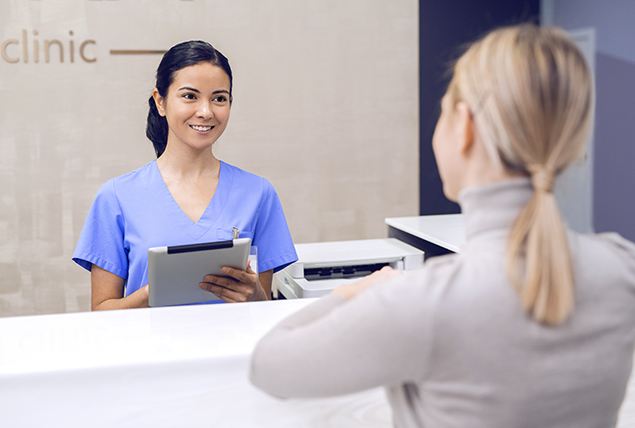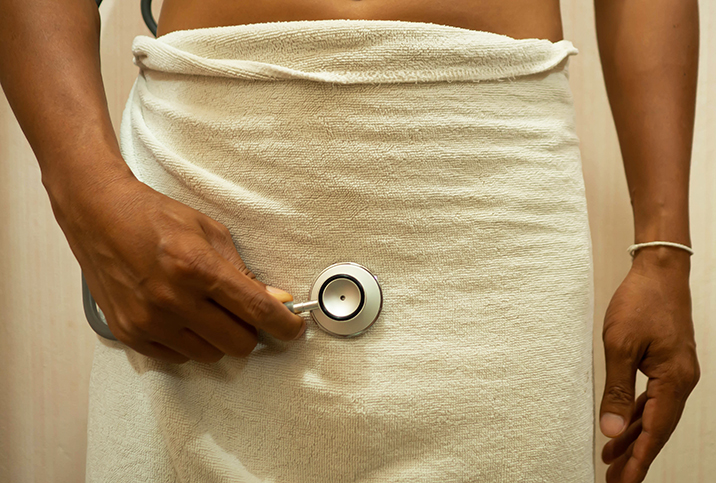Visiting a Sexual Health Clinic: What to Know Before You Go

Though under-discussed and often stigmatized, sexual health matters. Your reproductive fitness affects all other aspects of health, including your physical, mental, emotional and social well-being.
Taking care of your sexual health means keeping your body healthy, talking with your partner about your sexual relationship, and practicing safer sex to prevent unplanned pregnancies and sexually transmitted infections (STIs).
It also means having access to the reproductive health information and services you need to make this possible—and that's where sexual health clinics come in.
What is a sexual health clinic?
Sexual health clinics are sometimes referred to as STI or STD clinics because they offer testing for sexually transmitted infections and sexually transmitted diseases (STDs), according to Edward Hook, M.D., the medical director of the sexually transmitted diseases control program for the Jefferson County Health Department in Birmingham, Alabama.
The terms STIs and STDs are often used interchangeably and refer to the same thing: infections that get passed from one person to another during sex. But that doesn't mean they are the same.
Yes, STDs and STIs are sexually transmitted, contagious and can lead to symptoms that need medical attention. It's accurate to say all STDs start as STIs, but not all STIs progress to the point of becoming STDs. When an STI is left untreated, it can develop into a disease, which is a sexually transmitted disease.
No matter the intricacies of STI versus STD, calling such facilities STI or STD clinics doesn't accurately describe the full range of services these organizations often offer, Hook said. In addition to STI screening, many sexual health clinics offer counseling, management, and HIV testing and care.
"Sexual health clinics are staffed by experts who can also provide useful information about topics related to sexual health," said Chase Cannon, M.D., an infectious disease physician and researcher at the University of Washington in Seattle. "People visit [these clinics] to get condoms, learn about contraception options or planning a pregnancy, or to receive preventative vaccines for HPV or hepatitis B."
They are far more than a way to obtain testing and treatments for STIs.
Who should visit a sexual health clinic?
"Any person who ever had sex in the past, is currently having sex or is considering having sex in the future can visit a sexual health clinic," Cannon said.
Sexual healthcare services are typically performed by a primary care provider, making sexual health clinics a good choice for people without one, Hook said.
Who should be tested for STIs, and how often?
You should get an STI test before you begin a sexual relationship with a new partner, said Jeffery Klausner, M.D., a clinical population and public health professor at the University of Southern California in Los Angeles.
Sexually active women under the age of 25 should be tested annually for chlamydia and gonorrhea, according to the Centers for Disease Control and Prevention (CDC), Klausner said.
Get screened annually for STIs if you belong to certain high-risk groups, such as those who exchange money or drugs for sex, as recommended by the CDC.
What happens when you visit a sexual health clinic?
A typical visit to the sexual health clinic will begin with questions about your sexual history. The physician will want an overview to better understand your health needs. It is a judgment-free zone.
A sexual healthcare provider may ask you about the following, according to Klausner:
- The gender and number of your sexual partners
- The type of sex you typically have (vaginal, anal, oral)
- Where you meet your partners (at bars, through friends, at church, via an app)
- Whether you have sex while intoxicated
- Whether you use substances
- Whether you participate in group sex
- Whether you've previously had sexually transmitted infections
- Your sexual enjoyment and performance (in case you have sexual function issues)
Inquiring about sexual pleasure is a fairly new development in the healthcare community, according to Klausner.
"Historically, sexual satisfaction and performance haven't been promoted as part of the routine sexual health checkup," Klausner said. "But now as [the health community] is shifting to a more holistic sexual health approach, it's critical that people talk about these," Klausner said.
What do I need to bring to my sexual health clinic visit?
When you visit a sexual health clinic, you should bring a government-issued I.D. and your health insurance card, if you have one. If you have specific questions, jot those down, along with the names of any medication you are taking and your health conditions.
What is included in a sexual health screening?
At most sexual health clinics, a typical STI test will screen for HIV, syphilis, chlamydia and gonorrhea, according to Hook.
"People often come in and say I want to be tested for everything," Hook said. "That's simply not possible because there are over 30 different infections in which the predominant way of transmission is through sexual activity."
Notably, herpes is not routinely tested for, Hook said. If you do want to be tested for herpes, you should request it.
What is involved in getting a test for STIs and STDs?
This depends on the person, their age and what body parts were exposed during sex, Cannon said.
STI tests typically involve one or more of the following:
- Blood testing. Blood tests are used to detect STIs and STDs such as HIV, syphilis and hepatitis. During a blood test, a healthcare provider will draw a small amount of blood from a vein, usually in your arm, and send it to a laboratory for analysis.
- Urine testing. Urine tests are often used to screen for chlamydia and gonorrhea. With this kind of test, you provide a urine sample to be tested in a laboratory.
- Vaginal swab. This involves using a cotton swab to collect a sample from your vaginal canal. Vaginal swabbing is usually used to test for STIs and STDs such as chlamydia, gonorrhea and trichomoniasis.
- Rectal swab. This type of swab is used to collect a sample from the rectum and is performed to test for conditions such as chlamydia, gonorrhea and syphilis in patients who engage in receptive anal intercourse.
- Oral swab. If there is a concern about STIs transmitted through oral sex, an oral swab may be used to collect a sample from your throat. This is primarily done for testing for conditions like gonorrhea and pharyngeal chlamydia.
"Usually, if someone has no symptoms, they can swab themselves to collect their own sample, which is simple, fast and easy," Cannon said. "If someone does have symptoms, a physical exam may be necessary to diagnose the problem, and the examining provider may collect samples themselves during that exam."
What are patient confidentiality guidelines?
Who will know you went to this clinic? It depends.
"Sexual health clinics have very strict confidentiality guidelines," Klausner said. "They typically have annual reviews and documentation from all their providers and require a level of training around sexual history confidentiality."
However, if you test positive for an STI, your test result may be reported to the local health department, Klausner said. The reporting process is confidential and allows healthcare professionals to work to prevent the spread of infectious diseases.
If I visit a sexual health clinic and I'm not 18, will they tell my parents or guardian?
"This depends on the state, but many states allow minors of a certain age to seek sexual health services without a parent or guardian's consent," Cannon said. "It's important to note that laws are currently in flux across the country that could affect adolescents and other people's ability to seek care for services like contraception or gender-affirming therapy.
Everyone should be aware of their state's laws and know what is or isn't permitted where they live.
Where can I get tested for STDs and STIs?
Anyone not sure about a sexual health clinic has plenty of options to get tested for STIs—many of which are low-cost, free or covered by insurance.
Here are some of the places you can get an STI test:
- Doctor's office. Most primary care providers can directly provide and refer patients to the sexual healthcare they need, Hook said. Your regular family doctor or gynecologist can conduct STI tests, discuss your concerns and provide treatment options.
- Sexual health clinics. Specialized STI clinics or sexual health clinics are dedicated to providing comprehensive testing, treatment and counseling services for STIs. These clinics often have experienced healthcare professionals who are knowledgeable about sexual health and offer confidential testing and support.
- Planned Parenthood centers. Planned Parenthood centers are nonprofit organizations offering reproductive and sexual healthcare services, including STI testing. They provide affordable, confidential testing and may also offer counseling and education on sexual health.
- Online home testing kits. Home STD tests may be purchased from online providers. These services allow individuals to order STI testing kits online, collect samples at home and send them to a laboratory for analysis.
Where can I find STI/STD testing with insurance?
"Since the CDC and the U.S. Preventive Services Task Force recommend routine screening for HIV or STIs for almost all people, insurance is required to cover at least annual screening tests," Cannon said, adding that screening beyond annual tests may not be covered by insurance.
Places that may accept insurance for STI testing include the doctor's office, local sexual health care clinic and Planned Parenthood. Check your insurance coverage to find out what is covered and what co-pays are required.
Where can I find STI/STD testing without insurance?
Searching "free STD testing in my area" online is a good place to start, Cannon said. The CDC also has resources for free HIV testing.
"Many sexual health clinics are so-called 'free clinics' that offer services at no charge or on a sliding scale based on income or insurance status," Cannon said. "Some states have patient assistance programs that can cover additional costs to where screening may be completely free."
He recommends calling a clinic to find out whether their services are free before making an appointment.
Another option for obtaining STI testing without insurance is an at-home STI kit, such as EverlyWell or LetsGetChecked. The price of these kits varies according to the type of test but typically ranges from $50 to $250, with more costly options testing for more STIs.
Do hospitals offer free STD testing?
Urgent care facilities often offer STD testing, but not for free. Even if your insurance covers an urgent care facility visit, you'll likely be required to pay a deductible.
Does the health department offer free STD testing?
Yes, many sexual health clinics are funded by city and county health departments. As such, these organizations are usually able to offer free or low-cost STD testing.
Is there an STD hotline?
Yes, many states have a number you can call for questions about STIs and HIV. Search Google or visit your state's health department website to find your local STD hotline.
The bottom line
Sexual health clinics aren't just for people who think they may have an STI.
"They're for anyone interested in preserving their sexual health," Hook said.
Don't wait for a problem to start taking care of your sexual health. Contact your local clinic to schedule an appointment and get your sexual health questions answered. Don't hesitate to speak with your doctor about your health concerns.


















